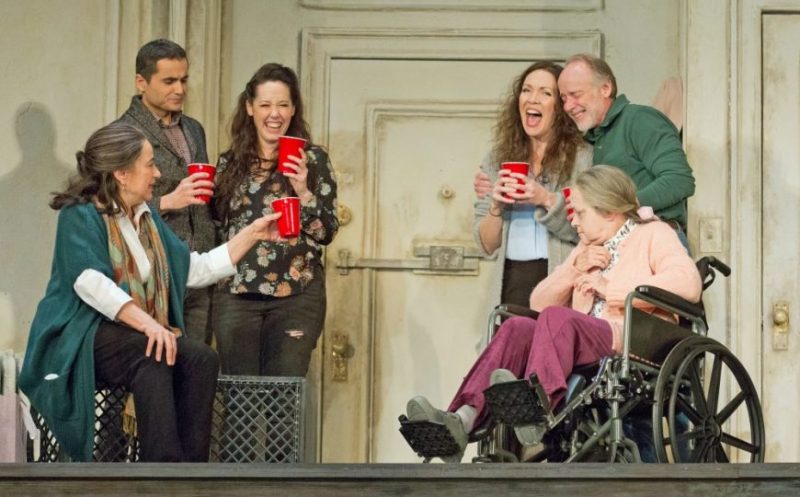
The Humans by Stephen Karam. Walnut Street Theatre, Philadelphia, January 2018.
The Humans is a warm-sad, interesting play. I am surely in the minority, however, in saying that I’m disappointed in its script.
Stephen Karam’s play won many awards, and the Walnut Street Theatre’s spokesman emphasized that fact in his pre-curtain speech. Expectations thus were raised excessively.
The play has a slight resemblance to Tracy Letts’s August, Osage County in that they both center on a gathering of a troubled family. But that comparison is superficial. August has shocking revelations and dramatic punch; The Humans meanders in naturalistic fashion and gives up its secrets grudgingly.
On the plus side, the dialogue sounds natural in its overlapping and the characters are endearing. With relatively inconsequential action, the focus is on the tenderness of a lower-middle class family. The Humans explores the disappointments and fears of these ordinary people — fear of poverty, ill health, old age, loss of love, death. On the minus, there’s excessive foreshadowing and obvious set pieces.
Coming together for Thanksgiving dinner are a middle-aged couple from Scranton Pennsylvania, their daughters, and a grandmother suffering from dementia. The father (Greg Wood) recently lost his job as a school janitor while his wife (Mary Martello) is continually passed over in favor of young, less-experienced employees at her job. The elder daughter (Jennie Eisenhower) is distraught because of the end of a love affair, and ill health, and a possible loss of her position as an attorney, while the younger child (Alex Keiper) has moved in with her boyfriend (Ibrahim Miari), thus incurring disapproval from her traditional mother.
Wood as the father is hesitant and tongue-tied. It’s obvious that he has some affliction, or he’s hiding some secret. When the revelation comes, it’s anti-climactic and weak. The most outstanding performances are by an amusingly caustic Martello and an ebullient Keiper. Sharon Alexander adeptly handles the physical difficulties of the grandmother.
My own household included members with two diseases that are presented in this story — Alzheimers and colitis — and I have reservations about the stereotypical way these afflictions are shown. Just one example: the grandmother is in an advanced stage of dementia, in a wheelchair, barely able to move or speak. Yet the family allows her to sit at the dinner table and try to feed herself. No wonder that she knocks her plate to the floor, creating a moment of ersatz drama. The compassionate and usual way to handle this is for the family to welcome their matriarch to the table and hand-feed her.
Bernard Havard directs superbly, weaving among a multitude of playing areas in a bi-level set representing the ground floor and basement of a run-down apartment building in Manhattan’s Chinatown, designed by Roman Tatarowicz with eerie lighting by Shon Causer.
An indecisive ending actually is a virtue, because it emphasizes the lack of easy solutions. Disquieting and unsettling plunges into darkness hint at supernatural horror, which adds dimension to the play.